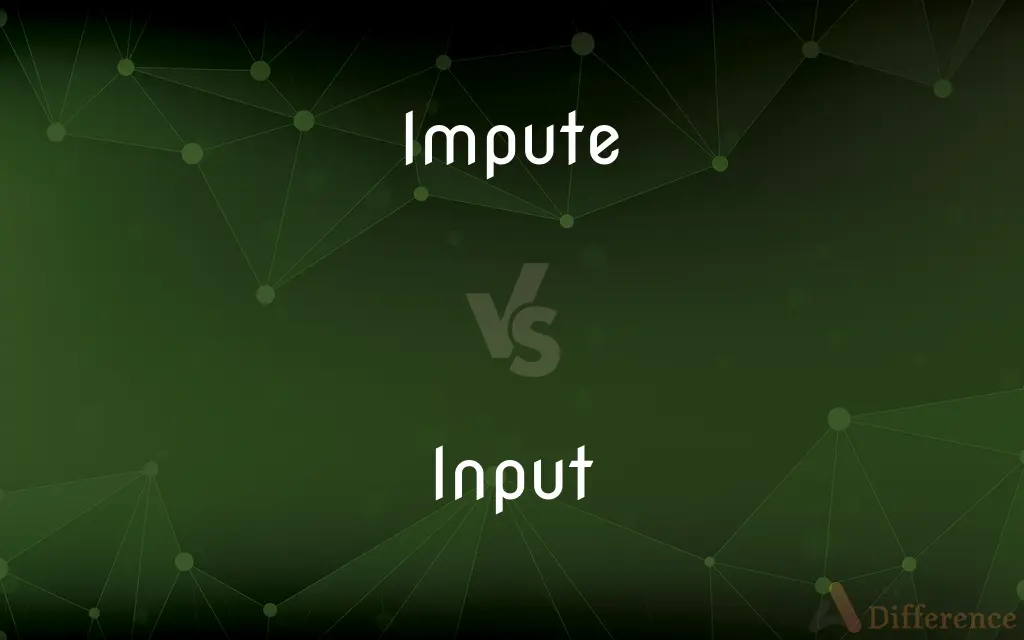Impute vs. Input — What's the Difference?
By Tayyaba Rehman & Urooj Arif — Updated on March 18, 2024
Impute means to attribute or ascribe a quality, action, or fault to someone or something, often involving responsibility or blame, while input refers to the data entered into a system or the contribution of ideas, information, or resources.

Difference Between Impute and Input
Table of Contents
ADVERTISEMENT
Key Differences
Impute is used primarily in legal, financial, and moral contexts to attribute responsibility, blame, or credit to individuals or entities, often implying a judgment or assumption about their role in a specific situation or action. This process can involve a complex assessment of causality, liability, or merit, and may not always be based on direct evidence. On the other hand, input encompasses the act of supplying data, information, or physical effort into a system, process, or discussion. It focuses on the provision or contribution of resources, ideas, or energy towards achieving a particular outcome, emphasizing the role of participation and influence rather than attribution of blame or credit.
In the context of computing, to impute can mean inferring missing data within datasets, a process that attributes values based on correlations or patterns identified in the data. This use aligns with the broader meaning of imputation as attributing qualities or values not explicitly provided. Conversely, input in computing specifically refers to the data or commands entered into a computer or software system, highlighting the action of feeding information into a system for it to process or respond to.
Imputation deals with attributing income or financial transactions to entities for tax purposes, reflecting assumptions about ownership, control, or benefit. It's a mechanism to ensure fair taxation or distribution of credits among parties, often requiring sophisticated understanding of tax laws and financial regulations. In contrast, input in a financial context might refer to the investment of capital, resources, or labor into a business or project, focusing on the contribution aspect without implying judgment or attribution of outcomes.
In teamwork or collaborative projects, imputation might occur when assessing responsibility for outcomes, successes, or failures, possibly leading to recognition or accountability measures. It involves evaluating individual or group contributions in terms of their impact on collective results, with a focus on moral or ethical implications. Input, in these scenarios, is about the ideas, work, and insights contributed by team members, valued for their role in driving the project forward without necessarily linking them directly to the success or failure of the endeavor.
Both terms underscore the importance of contribution and attribution in different contexts. While imputation focuses on assigning qualities or blame based on inferred connections or regulatory frameworks, input emphasizes the act of contributing or providing something necessary for a system or process to function, devoid of any implicit judgment or moral assessment.
ADVERTISEMENT
Comparison Chart
Definition
To attribute or ascribe qualities, actions, or faults to someone or something.
To provide data, ideas, or physical effort into a system or process.
Context
Legal, financial, moral
Computing, information processing, teamwork
Implication
Often involves judgment or assumption about responsibility or blame.
Focuses on the act of contribution or provision of information.
Usage Example
Imputing negligence in a legal case.
Entering data into a computer system.
Outcome
Attributing responsibility or credit.
Facilitating processing, analysis, or discussion.
Compare with Definitions
Impute
To estimate values in missing data.
Missing survey responses were imputed based on existing data patterns.
Input
Physical effort or resources contributed to a project.
Additional input from volunteers made the event successful.
Impute
To attribute blame or credit to someone or something.
The fault was imputed to the company's lack of safety protocols.
Input
Commands or actions performed on a device.
The device responds to voice input.
Impute
To ascribe a quality or action by inference.
Integrity was imputed to her based on her consistent actions.
Input
Engaging in providing feedback or suggestions.
We encourage input from all team members during meetings.
Impute
To infer or suggest something indirectly.
His silence was imputed as agreement with the decision.
Input
Contributions of ideas or expertise.
Her input was crucial in solving the problem.
Impute
In finance, to assign income or transactions to a party for tax purposes.
Dividend income was imputed to shareholders.
Input
Data or information fed into a system.
The program requires user input to proceed.
Impute
Represent (something, especially something undesirable) as being done or possessed by someone; attribute
The crimes imputed to Richard
Input
What is put in, taken in, or operated on by any process or system
There is little input from other members of the team
Data input
Impute
Assign (a value) to something by inference from the value of the products or processes to which it contributes
By imputing the interest rates they potentially introduce a measurement error
Input
A place where, or a device through which, energy or information enters a system
The signal being fed through the main input
Impute
To relate (something, usually something bad) to a particular cause or source; place the fault or responsibility for
Imputed the rocket failure to a faulty gasket.
Kindly imputed my clumsiness to inexperience.
Input
Put (data) into a computer
Test results can be inputted by the technician in the laboratory
Impute
To assign as a characteristic; credit
The gracefulness so often imputed to cats.
Input
Energy, work, or power used to drive a machine.
Impute
(transitive) To attribute or ascribe (responsibility or fault) to a cause or source.
The teacher imputed the student's failure to his nervousness.
Input
Current, electromotive force, or power supplied to an electric circuit, network, or device.
Impute
To ascribe (sin or righteousness) to someone by substitution.
Input
Information put into a communications system for transmission or into a computer system for processing.
Impute
(transitive) To take into account.
Input
Any of the items, including materials, equipment, and funds, required for production.
Impute
(transitive) To attribute or credit to.
People impute great cleverness to cats.
Input
The act of putting in; infusion
A steady input of fuel.
Impute
To replace missing data with substituted values.
Input
An amount put in.
Impute
To charge; to ascribe; to attribute; to set to the account of; to charge to one as the author, responsible originator, or possessor; - generally in a bad sense.
Nor you, ye proud, impute to these the fault,If memory o'er their tomb no trophies raise.
One vice of a darker shade was imputed to him - envy.
Input
Contribution of information or a comment or viewpoint
A discussion with input from all members of the group.
Impute
To adjudge as one's own (the sin or righteousness) of another; as, the righteousness of Christ is imputed to us.
It was imputed to him for righteousness.
They meritImputed shall absolve them who renounceTheir own, both righteous and unrighteous deeds.
Input
To enter (data or a program) into a computer.
Impute
To take account of; to consider; to regard.
If we impute this last humiliation as the cause of his death.
Input
The act or process of putting in; infusion.
Impute
Attribute or credit to;
We attributed this quotation to Shakespeare
People impute great cleverness to cats
Input
That which is put in, as in an amount.
Impute
Attribute (responsibility or fault) to a cause or source;
The teacher imputed the student's failure to his nervousness
Input
Contribution of work or information, as an opinion or advice.
You can provide input via this form.
Input
Data fed into a process with the intention of it shaping or affecting the output of that process.
Sound input
Input
(electronics) An input jack.
Model with A/V input
Input
(transitive) To put in; put on.
Input
(transitive) To enter data.
The user inputs his date of birth and the computer displays his age.
Input
(transitive) To accept data that is entered.
Input
Signal going into an electronic system
Input
Any stimulating information or event; acts to arouse action
Input
Enter (data or a program) into a computer
Common Curiosities
Can impute have positive connotations?
Yes, it can attribute positive qualities or credit, although it's often used in contexts involving blame.
What does it mean to impute something to someone?
It means to attribute a quality, action, or fault to them, often implying a level of responsibility or blame.
Can impute be used in a neutral context?
While often associated with responsibility or blame, impute can be used neutrally to denote attribution without moral judgment.
How can imputation be applied in data analysis?
In data analysis, imputation is used to estimate and fill in missing data points to allow for more comprehensive analysis.
How is input used in computing?
Input in computing refers to data or commands entered into a system for processing.
What types of input are valuable in teamwork?
Ideas, expertise, physical effort, and constructive feedback are all valuable forms of input in teamwork.
What makes input critical in decision-making processes?
Diverse input can provide a broader perspective, more information, and greater insight, leading to better-informed decisions.
Can input from different sources be integrated?
Yes, integrating diverse sources of input can enrich understanding and solution development in complex systems or projects.
How do finance professionals use imputation?
They use it to attribute income or transactions to parties for purposes such as taxation, applying rules to ensure fair distribution of tax credits or liabilities.
Why is careful imputation important in legal contexts?
Because it involves attributing responsibility or fault, accurate imputation based on evidence is crucial to ensuring justice and fairness.
Is input always tangible?
No, input can be intangible, such as ideas, suggestions, or data, as well as tangible efforts or resources.
How does imputation affect tax liabilities?
By attributing income or transactions to certain parties, imputation can impact their tax liabilities, potentially redistributing tax obligations more equitably.
How can technology improve input processes?
Technology can facilitate easier, faster, and more accurate collection and processing of input, enhancing overall system efficiency.
What challenges are associated with data imputation?
Ensuring accuracy and avoiding bias are major challenges, as imputed values can significantly influence data analysis outcomes.
How does input affect the outcome of a project?
Quality input can significantly enhance the direction, efficiency, and success of a project by providing necessary information and perspectives.
Share Your Discovery

Previous Comparison
Elegant vs. Eloquent
Next Comparison
Impulsive vs. SpontaneousAuthor Spotlight
Written by
Tayyaba RehmanTayyaba Rehman is a distinguished writer, currently serving as a primary contributor to askdifference.com. As a researcher in semantics and etymology, Tayyaba's passion for the complexity of languages and their distinctions has found a perfect home on the platform. Tayyaba delves into the intricacies of language, distinguishing between commonly confused words and phrases, thereby providing clarity for readers worldwide.
Co-written by
Urooj ArifUrooj is a skilled content writer at Ask Difference, known for her exceptional ability to simplify complex topics into engaging and informative content. With a passion for research and a flair for clear, concise writing, she consistently delivers articles that resonate with our diverse audience.
















































